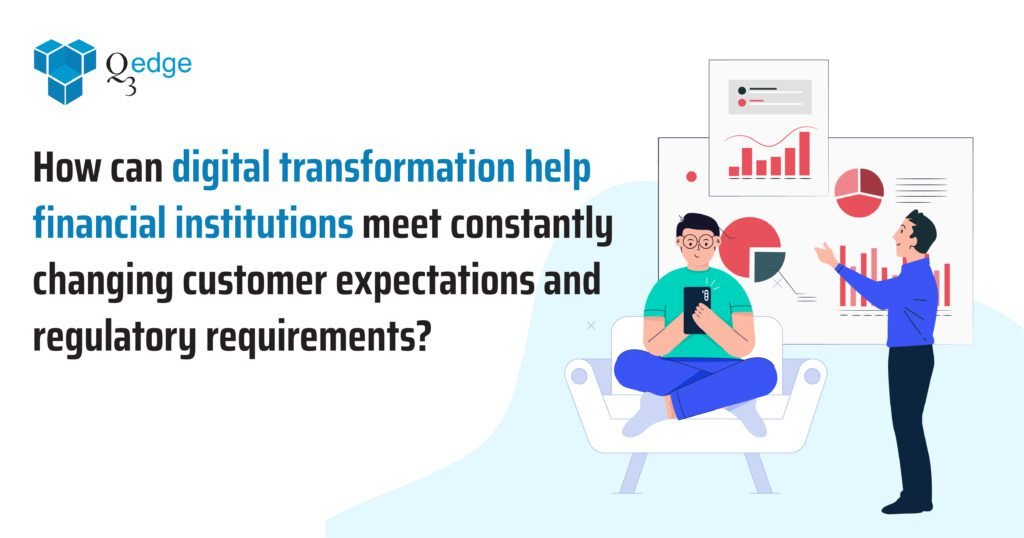How can digital transformation help financial institutions meet constantly changing customer expectations and regulatory requirements 2023?

As the influence of the internet and technology is increasing in this world, consumer expectations are rising dramatically. Today people want everything digital in the form of online services or applications. We all know the traditional processes and culture of the finance industry. But today, people want digital transformation in financial services to gain maximum benefits without much effort. Is this going to change? Unfortunately, the customer’s expectations will rise as we progress towards a fully digital world.
What do you think is the solution for the rising customer expectations? The best and ideal solution is for the finance industry to adopt digital transformation strategies to fulfil customer expectations and improve customer services. The main reason for these financial industry expectations is their laid-back customer service. Hence, by going digital and improving customer services, you can meet customer expectations and regulations along with other positive consequences, like more customer engagement, fruitful collaborations, partnerships, and high revenue generation.
Customer Expectations in the Digital Age
The rise of the internet and technology led to an increased customer mindset, eventually leading to high expectations. If you remember the olden days, you had to wait in a long queue in banks to deposit or withdraw money. During those times, the lack of resources made people think customer service was unnecessary in the finance sector. However, with changing times, people have upgraded and become financially aware. It makes financial services with traditional norms and protocols difficult to survive.
With the rise of the digital age, most people carry a smartphone and gadgets. The reach of financial knowledge has also increased gradually. The pandemic also had a substantial effect on financial awareness and penetration. The digital age has heightened customer expectations as today; people want services quickly and in the comforts of their homes. Hence, it is crucial to cater to consumers’ rising demands and expectations.
The best way to deal with the situation is to adopt digital transformation. The technology and innovation in the finance sector are mind-blowing, and they will help you meet your consumer’s expectations and provide them with high-quality customer service.

Regulatory Requirements in the Digital Age

Regulatory requirements in the digital age are necessary. These regulatory compliances help financial institutions to function smoothly and also help deal with cyber attacks appropriately. Financial institutions must have a regulatory compliance plan to prevent cyber threats. The regulatory compliance plan can include- performing regular security updates, ensuring zero insecure connections, routine backups, and having intrusion detection software as a proactive approach against cyber criminals.
Some of the regulatory Compliances for financial data protection are- General Data Protection Regulation (GDPR), the Payment Card Industry Data Security Standard (PCI DSS), and Gramm-Leach-Bliley Act (GLBA). Some laws of financial regulatory compliance are- Sarbanes Oxley Act (SOX), Anti-Money Laundering Directives (AML), and MiFID II. Abiding by these laws and acts can help financial institutions in many ways. Adopting digital transformation is the best way to abide by these laws and acts.
Digital Transformation Strategies in Financial Services
Here are some of the strategies that you can implement while incorporating the digital revolution in financial institutions:
Lorem ipsum dolor sit amet, consectetur adipiscing elit. Ut elit tellus, luctus nec ullamcorper mattis, pulvinar dapibus leo.
1. Creating a Culture of Innovation
- With the growing demand and customer expectations these days, it is crucial always to adopt newness and facilitate changes in the system.
- Continuous innovation is the best way to implement positive changes in the system.
- With the constant growth in technology, implementing a culture of innovation is the road to success in the finance sector.
- Innovation in the financial services business will strengthen the digital culture in your firm.
2. Investing in technology and infrastructure
- Going digital in the financial world primarily means investing in world-class innovative technology.
- Digital Infrastructure will help in several ways in a finance firm.
- It will reduce the burden of manual tasks and increase the efficiency of transactions and other financial services due to incorporating the latest technology.
- Automation due to technology and infrastructure will help eliminate repetitive tasks, improving the business’s productivity.
3. Partnering with fintech companies
- The main competition of traditional financial institutions is the latest fintech companies.
- These fintech companies have understood the importance of customer service and the digital revolution early and adopted systems to provide better service.
- Hence, it is ideal for finance businesses to adopt the digital revolution and partner with fintech companies.
- These collaborations and partnerships will help build high-quality systems that satisfy customers.
4. Developing agile business processes
- Agile concepts in financial institutions help adopt the digital revolution with the seamless shift in culture and technologies.
- It also involves implementing and executing digital skills in the firm’s workforce for smoother organizational functioning.
- An agile finance institution has improved efficiency with flexibility and resilience.
- It also helps provide innovative and faster services as it shows real-time data.
Transform your operations, achieve your goals
with our expert BPM consulting.
Benefits of Digital Transformation
There are several benefits of digital transformation in financial services. They are:
Improved Customer Experience
- Digital service in the finance sector improves the customer experience.
- It provides a seamless and convenient experience for consumers.
- Today’s customers are tech-savvy, and they expect quick services.
- Moreover, digital banking offers people financial services at their fingertips.
- It also helps with customer engagement in financial institutions.
- It also helps create personalized products and services for consumers, eventually improving customer service.
- Digital financial services help customers access financial assistance anytime and anywhere, enhancing the customer experience.
Increased Operational Efficiency
- Have you ever noticed the ease and comfort your phones and laptops have given you? Isn’t it amazing that you can access so many things in this world just by a click of a button?
- Now you can imagine the amount of operational efficiency digital transformation in the finance sector has created.
- Digital services help streamline operations in your company and automate manual tasks.
- Most digital technologies, like artificial intelligence, blockchain, cloud computing, etc., reduce the time and cost of financial transactions.
- Automation in the finance sector eliminates human error and enhances efficiency.
- Digitization also helps integrate and share data across various systems in the company improving operational efficiency.
- Digital transformation in financial institutions provides a smooth switch from legacy applications to a user-friendly centralized system.
Time And Cost Savings:
- As digital transformation in financial services promotes cashless transactions, which reduces expenditure on intermediary channels as it saves a lot of money.
- The traditional systems in the finance sector were mostly manual.
- However, when the digital force came into the picture, technology became the workforce in financial institutions.
- The game changed from hardware to software, eventually saving unwanted expenditures in finance firms.
- Digital transformation forces finance firms to reduce manual processes, paper-based transactions, and infrastructure costs.
- The cost-effectiveness achieved through this process helps provide more benefits to customers.
- Automation via digital transformation helps reduce human errors, decreasing the manual workload and increasing the financial institution’s productivity and efficiency by reducing repetitive tasks.
Decisions backed by Real Data
- Digital Transformation in financial institutions includes incorporating technologies like Artificial Intelligence, Machine Learning, Cloud Computing, Big Data, etc.
- These technologies help in gathering accurate and real-time data with advanced analytics.
- The data achieved from these technologies help financial institutions make tough decisions faster and simultaneously meet customer needs and demands.
- These analytics from digital techniques help financial institutions get valuable insights and optimize growth.
Facilitates Innovation
- Digital Transformation in financial services promotes continuous innovation in the organization.
- As these technologies reduce manual tasks, they boost productivity in the firm by allowing employees to innovate and create new products.
- They also help create products that provide value and serve the customers in the best possible ways.
- Digitization also enables financial institutions to collaborate and partner with fintech companies to develop new business models for the best interest of the consumers.
Regulatory Compliance
- Regulatory compliance is a very important factor in financial services firms.
- By adopting digital methods and protocols, financial institutions easily follow regulatory compliances.
- It also enables them to prevent cyber attacks, fines, penalties, etc.
- Moreover, it helps them build a stronger company reputation in the consumer’s eyes.
Easy Data Management
- With digital transformation in financial institutions, data management becomes a cakewalk.
- Earlier, the manual data management system was tedious; however, with cloud-based technologies, data collection, management, and storage have become more effective and efficient.
- Cloud-based digital transformation solutions help smooth transition during events like mergers and acquisitions, which is common in finance.
Challenges of Digital Transformation

We all understand the importance of digital transformation in the finance sector. However, there are some challenges that financial institutions face while making the switch. The following are the challenges the finance industry faces while adopting digital strategies.
Burden of Budget
- Finance or Budget is the single most barrier for banks to go digital.
- Adopting digital means in finance requires investing in several technologies and software subscriptions.
- Hence, digital transformation in financial services requires major capital investment, which can be a big challenge.
- According to a study by Forbes, a threat-proof & state-of-the-art technology costs more than 10 per cent of other expenses of the banks.
- The best way to cross the barrier is to understand that the ROI for the investment is much higher, and it is the best step towards progress.
Culture Resistance
- The company culture forms the essence of any sector.
- While making such a huge shift from traditional banking methods to digital solutions, company culture can be the main resistance.
- There will be several limitations that the people in the company must surpass and always keep an open mind which can be challenging.
- The ideal requirement for the financial services organization is to become agile, diverse, and open to innovative ideas.
- Adopting the above cultural mindset will help in a quick and seamless digital switch.
- On the contrary, finance firms that primarily depend on a mainstream hierarchy of management where decisions don’t involve all stakeholders have a high chance of drifting away from the digital revolution.
- In the above firm culture, the entire workforce abandons digital initiatives.
- Hence, leaders need to step in and provide appropriate training and brainwashing to their subordinates in each department.
- It will help the entire workforce to make the digital switch appropriately and boost the organization’s culture as it adapts to major system changes.
Poor Leadership
- Leaders in an organization are very important because they influence the mindsets of their subordinates.
- The primary factor responsible for bringing digital transformation into financial services is the approval of the leader to accept such change.
- However, most leaders in the finance sector have underestimated the need for the digital revolution, that’s why it is a big challenge in this industry.
- Here are some of the reasons why leaders are backing out from the digital revolution:
- The shift from outdated processes to modern technological solutions
- The heavy investment required to bring digital transformation
- The fear of taking a big risk by choosing the digital revolution.
- But with time, the leadership mindset is changing as the young generation is stepping into this domain.
- The best way to make cultural shifts & digital revolution in the finance sector is by compiling employee and CX data. For example, you can conduct a customer survey to ask them about the features and utilities they want to experience in their digital banking experience.
- With each level of digital transformation, you must evaluate the KPIs of your team and customer engagement rate that can help you calculate an appropriate ROI.
- These above methods are useful to encourage senior leaders and decision-makers to invest in digital technologies.
Poor Digital Management
- Most leaders may surpass the barrier of the digital revolution and embrace it. Still, the real deal is to manage the digital front with conviction after establishment.
- An experienced project leader with domain expertise and an efficient digital transformation strategy is the key to successful digital transformation.
- The absence of a clear definition of digital outcomes and areas of initial implementation is the biggest challenge in bringing the digital revolution to the finance sector.
- If your approach to the digital revolution is with traditional practices, going digital can be a serious challenge
- Hence, the ideal thing to do before adopting the digital revolution is to initiate an effective strategy, clear project goals, relevant & industry-specific KPIs, and a well-aligned team.
- You must also ensure that all the relevant stakeholders are onboard throughout the project; this will help bridge the gap between the banking and tech teams.
Lack of Knowledge Sharing
- Another huge challenge in the finance sector is the lack of knowledge sharing in this industry.
- Due to regulatory and security compliances, the tech teams and the banking department work separately, which creates a knowledge barrier between the two parties.
- The result is poor communication and an abrupt digital transformation in the finance sector.
- Hence, it is necessary to have access to the right data and information at each phase of the digital project development.
- You must incorporate a centralized knowledge base for a satisfactory digital revolution.
- Building a highly collaborative knowledge exchange can boost the digital revolution in your organization.
- You must include all managers and team members to access the right information whenever necessary.
- Your knowledge-sharing portal must be agile so that you can instantly adapt to the ongoing changes in your finance firm.
Conclusion
Digital transformation in financial services is the need of the hour. Today the world is moving from wired telephones to wireless smartphones. In this technological era, providing superior customer service with traditional manual systems is impossible, especially in the banking sector. Also, with digitization, people have become more aware and knowledgeable. Hence, most people know the value of customer service, and they expect a high standard of service which is affordable and quick.
The changing and demanding customer expectations are a great push for the finance sector to rise and adopt the digital revolution. Another factor that plays a crucial role in promoting digital transformation in the finance sector
You May Also Like,
- Business Process Mapping
- Top 10 Business Process Mapping Tools For Increasing Business Efficiency
- What is Business Process Design, Steps and Importance ?
- Business Process Improvement Methodologies to Smoothen the Workflow
- The Complete Breakdown of Business Process Analysis
- Types of Business Process System
Take Action Now and Make a Difference
Feel Free To Contact Us for Further Information
One comment
Comments are closed.





[…] part of a larger journey. By mapping this end-to-end lifecycle, businesses can illuminate how customer expectations evolve at each […]